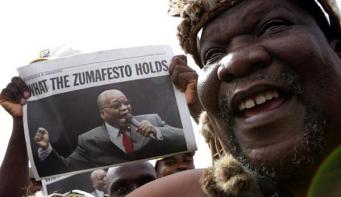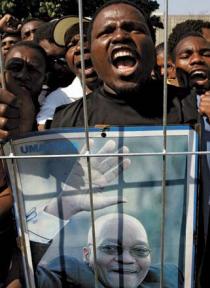Last Friday I had dinner with a gifted Belgian entrepreneur and good friend.
Entrepreneurship is (and always has been) on a low level in Belgium. We were discussing on the reasons for this old pain. A bottle of wine further in the conversation, we were discussing on the raging inflation in Belgium. My good friend pointed to his high rental costs and why he thought it would have been better to buy the house he lives in. I asked him the rental cost he currently pays and we made an estimate of the realistic low price he could be buying the house for. It took us 30 seconds to calculate that at the current interest rates, which can only further rise in 2008, my friend is actually doing a very good deal on renting his house versus buying it. Only of course of he would calculate in a 15% yearly added value on his property; which is very implausible course insane in the current market context.
Which brings me to the real reason why Belgians don’t make good entrepreneurs: they believe that putting their money in bricks yields higher added values than putting their money in their business. I'm not referring to my friend, he actually sold his apartment to put his money in his business. But deep down his instinct tells him he is losing tons of money by renting a house instead of buying. Just look at the graphs: in Holland and Belgium the financing of real estate amounts more than 109% of the GDP of each country. In Brazil this figure is today 2%.
Emerging South
The world upside down.
-
Dec 24 2007
-
Dec 22 2007
 As follow-up on the post of last Wednesday: Jacob Zuma has indeed been elected as new president of the ANC Party. Below is an overview of the press-reactions:
As follow-up on the post of last Wednesday: Jacob Zuma has indeed been elected as new president of the ANC Party. Below is an overview of the press-reactions:
December 19: The Economist: Zuma comes out on top
“Whatever happens, the relationship between the government, dominated by Mr Mbeki's faithful, and an ANC led by Mr Zuma will be awkward. The next few months could see either a patching-up of the rift over the succession or a purge inside the party of Mbeki loyalists. There are even questions over whether Mr Mbeki will finish his full term as the country's president, although Mr Zuma has said that he sees no reason for his early departure.”
December 19: UBS analysis: Jacob Zuma won leadership of South Africa’s Ruling ANC Party
“Looking at ZAR and equity levels before and after the announcement, it appears that the markets have not priced in a big political risk premium on South Africa, despite Zuma's background in trade union politics, legal wrangles (prosecutors to decide about charges soon), and less than clear stance on free market policies. Zuma did pledge not to change the country's economic policies if elected as president. It seems the market views him in the same vein as Lula in Brazil, the Congress coalition in India and PM Fico in Slovakia, all of who were initially feared to be populist, but eventually stuck to free market policies in practice. We think this is a reasonable base case view for Zuma as well, but we would not get complacent on this, and point to one big risk. Lula, Fico and India's communist backed coalition have governed through times of strength in the economic cycle. By contrast, the next ANC leader may find himself at the helm of a slowing South African economy, and potentially also facing more tricky international credit conditions. In our view, this increases the risk of populist policies.” -
Dec 21 2007
One of the annoying things in Europe and America is the misrepresentation of Latin America in the English, French and Dutch speaking press. Personally I prefer relying on what I see and hear personally than what biased journalists want me to believe. One of those reliable sources is the yearly survey the Chilean polling firm 'Latinobarometro' publishes every year.
In 2007, 20.000 people from Latin America have been surveyed. The surveys were performed by reputable local polling companies such as Gallup and MORI. The study was published mid November. But strangely enough, no English speaking media has published an article on this important snapshot of Latin American views and opinions. When reading the 112 page long report of the survey, you’ll understand how fundamentally different the democracies in Latin American are becoming from the United States and most European countries. If we would plug in the answers from Belgian citizens in the charts of the report, we would quickly understand that the basis of the political crisis in Belgium is actually not a political crisis but a crisis of its citizens and their belief in the kind of democracy Belgium has become. -
Dec 20 2007
Earlier this year, analysts projected Brazilian GDP to grow at 4,9% in 2007. I found this figure to be ambitious. The reality is that Brazil will be clocking off 2007 with a substantial higher growth rate since the Brazilian economy expanded with a 5,7% in the third quarter. Brazil has been consistently lowering its interest rates over the past year, fueling consumer and business spending. Only now speculation arises that the Brazilian bank may keep borrowing costs unchanged for most of 2008 to cap inflation. For me personally this is good news. This will keep supporting the high Brazilian currency rate and make a nice yield on Brasilian bonds. I however believe that the Brazilian economy would thrive on a further decrease of the interest rate to a 9%.
There is a growing consensus amongst analysts that the US (and EU) economy is moving towards a recession in 2008. Some believe it to be a mild recession, personally I bet on a more severe scenario. I have the impressions that US and EU policy makers are not really fully aware of the significant downward risk to growth. Typically economists tend to overestimate the risk of rising inflation and underestimate the risk of downward growth. Especially today this is the case; there seems to be a view that EU and US growth will have just a 'dip' and resume in the second half of 2008. I'm (very) wary of such a scenario in the context of the current macro economical policies applied by the US and the EU. -
Dec 19 2007
 This weekend, the ruling South African party, the ANC, will decide the leadership of the party. By monday we know who the ANC will put forward in the presidential elections of 2009. Current ANC president Mr. Thabo Mbeki is not eligible for re-elections, since he is currently in his second term; but as ANC president he could keep on controlling the powers and handpick himself his successor in 2009. Technically, the new president of South Africa will only be voted in 2009. But since the ANC controls more than 70% of the votes, the decision will be made this weekend. Current president Mr. Mbeki is the most prestigious political leader on the African continent. He has done well in managing the South African economy, which has achieved an unprecedented growth the past 8 years. Yet, despite this success, the benefits of this growth have not reached the poor. Poverty remains an increasing major problem of South Africa. Currently Mr. Jacob Zuma, 65 is the frontrunner for this weekends elections. He was fired by current president Mr. Mbeki as deputy president of the country last year over corruption allegations and positions himself as a champion of the poor. He is also a Zulu, the largest black tribe. The last two presidents Mr Mandela and Mr Mbeki were both Xhosas.
This weekend, the ruling South African party, the ANC, will decide the leadership of the party. By monday we know who the ANC will put forward in the presidential elections of 2009. Current ANC president Mr. Thabo Mbeki is not eligible for re-elections, since he is currently in his second term; but as ANC president he could keep on controlling the powers and handpick himself his successor in 2009. Technically, the new president of South Africa will only be voted in 2009. But since the ANC controls more than 70% of the votes, the decision will be made this weekend. Current president Mr. Mbeki is the most prestigious political leader on the African continent. He has done well in managing the South African economy, which has achieved an unprecedented growth the past 8 years. Yet, despite this success, the benefits of this growth have not reached the poor. Poverty remains an increasing major problem of South Africa. Currently Mr. Jacob Zuma, 65 is the frontrunner for this weekends elections. He was fired by current president Mr. Mbeki as deputy president of the country last year over corruption allegations and positions himself as a champion of the poor. He is also a Zulu, the largest black tribe. The last two presidents Mr Mandela and Mr Mbeki were both Xhosas.
Tags
American protectionism ANC Andrew Feinstein Apartamento em Niteroi Argentina argentina Azul Belgian-strike belgium biodiesel bonds borderlinx BOVESPA bovespa Brazilian_economy brazilian_real_currency_rate Brazil weekly news carbon casa casa em Florianopolis Colinas do Mar COPE credit crisis deflation dollar entrepeneurs environment ethanol EU recession exchange external_debt flights florianopolis food Gafisa GDP Brazil German_productivity global recession inflation Inga innovation interest rate Brazil interest rate South Africa keatingeconomics Latin America leisuretime Mbeki movie mozambique music national credit act Oceanair oil opportunity petrobras planning prime productivity real Real recession SAR sequoia solar South Africa south africa South_African_Economy south_africa_real_estate_2009 stagflation stocks timetracking united_states US economy 2009 US recession US_economy V-shape recession venezuela oil southafrica Zuma
Recent Comments
- Judith on Venezuela and South Africa: Signing Major Energy Deal I think I allready have been informed ab ...
- LuckyLuke on Linkedin discussion on BRIC countries Do you know that there is diet plan base ...
- JakeBoummaNom on Linkedin discussion on BRIC countries Hi to all. Hope i'm wellcome here. ...
- Illulavop on Linkedin discussion on BRIC countries http://imgwebsearch.com/35357/img0/casin ...
- fieftRopHoife on Linkedin discussion on BRIC countries Hi I'm going to buy a bike. Counld someo ...
- fieftRopHoife on Linkedin discussion on BRIC countries Hey I'm going to buy a bike. Counld some ...







